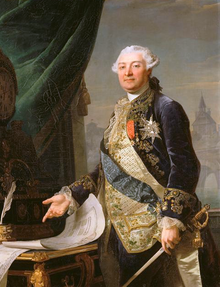Louis Auguste Le Tonnelier de Breteuil
| Louis Auguste Le Tonnelier | |
|---|---|
 |
|
| Chief Minister of the French Monarch | |
|
In office 11 July 1789 – 16 July 1789 |
|
| Monarch | Louis XVI |
| Preceded by | Jacques Necker |
| Succeeded by | Jacques Necker |
| Secretary of State of the Maison du Roi | |
|
In office 1784 – 24 July 1788 |
|
| Monarch | Louis XVI |
| Preceded by | Antoine-Jean Amelot de Chaillou |
| Succeeded by | Pierre-Charles Laurent de Villedeuil |
| Personal details | |
| Born |
7 March 1730 Azay-le-Ferron, France |
| Died | 2 November 1807 (aged 77) Paris, France |
| Religion | Roman Catholic |
Louis Charles Auguste le Tonnelier, baron de Breteuil, baron de Preuilly (7 March 1730 – 2 November 1807) was a French aristocrat, diplomat, statesman and politician. He was the last Prime Minister of the Bourbon Monarchy, appointed by King Louis XVI only one hundred hours before the storming of the Bastille.
Breteuil was born in 1730 at the chateau of Azay-le-Ferron (Indre) into a well-connected aristocratic family: one of his relations was confessor to the king's cousin and another was the famed mathematician and linguist Émilie, marquise du Châtelet-Laumont. He received an excellent education in Paris and later joined the army, where he fought in the Seven Years' War. In 1758 he left the army and joined the French Foreign Ministry. He was quickly appointed French ambassador to the elector of Cologne, where he proved to have valuable diplomatic skills. Two years later in 1760 he was sent to St Petersburg as the French ambassador to Imperial Russia, where he arranged to be temporarily absent from his post at the time of the palace revolution by which Catherine II was placed on the throne. In 1769 he was sent to (Sweden), and subsequently represented his government at Vienna in 1770 (Habsburg Monarchy), in 1773 Naples (Kingdom of Naples), and again at Vienna until 1783.
In Sweden, he became a favourite friend of the young King Gustavus III, but Catherine the Great of Russia disliked him. Others saw Breteuil as a loud and impulsive fool, Joseph II and several high-ranking Austrian politicians sneered at the "fool" behind closed doors.
...
Wikipedia
